Portland (Oregon) writer David Oates thinks Noah had the right idea when he built the Ark. He knew whatever survived the Great Flood would repopulate the world…two by two. Now, millennia later, the world is going through a biological bottleneck, a pinch point as brutal as God’s fury in Noah’s time…I remember Noah protested: I’m old, I’m tired, why me, O Lord? I ask the same thing; hell, I feel as old as Noah. The answer is that it’s got to be everybody, each asking, “What Ark can I build?” What restored marsh, what replanted prairie, what wildflower garden, what butterfly reserve, what organic farm, what beehive, what woodlot, what artificial reef? And this: What destruction can I stop? What oil terminal, what parking lot, what GMO crop, what poison-spraying truck, what clearcut?
-Kathleen Dean Moore, Great Tide Rising, pg 137
In 1999 the Union of Concerned Scientists wrote The Consumer’s Guide to Effective Environmental Choices. I read it then and it clarified a lot. Scientists were telling us what we needed to work on most and what we needn’t waste our time doing. In order to make a real difference we needed to change how we eat, how we transport and how we operate our homes. I decided right then to focus my time and energy on those three areas of work both in my personal life, so I can speak with integrity and in the socio-economic-political realm, so I can live with hope.
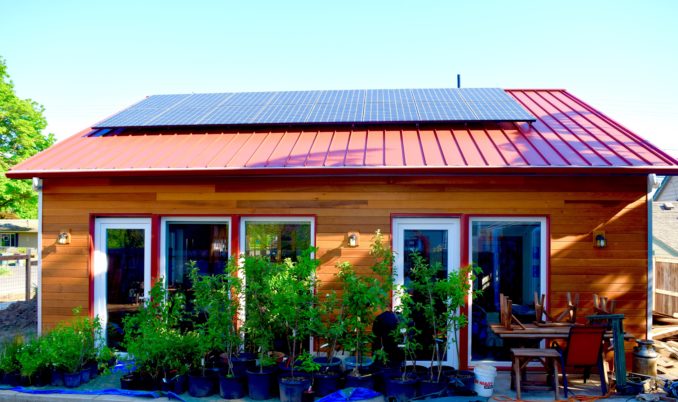
When Debbie and I set out to build a Net Zero house, one that would generate enough solar power to run itself and charge our electric car, we were finding our Ark. The summer of 2017 brought multiple mega-hurricanes, catastrophic floods and, closest to home, the wildfires that, in an instant, have wiped out entire neighborhoods and set the stage for dangerous landslides as fall rains pummel naked mountainsides. News commentators love to call these “events of Biblical proportion.” I wish they knew what they were saying.
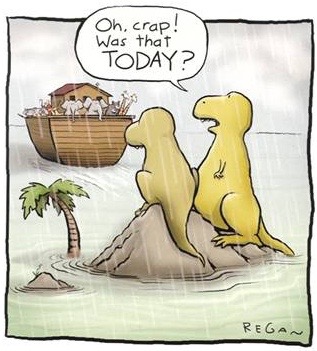 In the mythology of the Ancient Story, the prophets believed God caused apocalyptic events to devastate certain neighborhoods and peoples. It wasn’t just to make a good story…God did this because those with the wealth and power were behaving badly. For the most part they were responses to gross injustice: like subjugating whole races to slavery and millenial marginalization, doing violence to the same immigrants who were doing society’s grunt work and building castles and opulent places of worship for a few while the masses lived in the hell of poverty and genocide (you know…the kind of stuff that rarely happens anymore!). If we have advanced at all since back then, it is in the wisdom that some external Deity doesn’t cause these catastrophes. We know they are natural feedback loops. We know what goes around actually does come around. It’s not God biting us in the ass. It’s us with our heads so far into the place where the sun don’t shine that we devour our hearts and our collective conscience…the very same stuff of the image of God in us.
In the mythology of the Ancient Story, the prophets believed God caused apocalyptic events to devastate certain neighborhoods and peoples. It wasn’t just to make a good story…God did this because those with the wealth and power were behaving badly. For the most part they were responses to gross injustice: like subjugating whole races to slavery and millenial marginalization, doing violence to the same immigrants who were doing society’s grunt work and building castles and opulent places of worship for a few while the masses lived in the hell of poverty and genocide (you know…the kind of stuff that rarely happens anymore!). If we have advanced at all since back then, it is in the wisdom that some external Deity doesn’t cause these catastrophes. We know they are natural feedback loops. We know what goes around actually does come around. It’s not God biting us in the ass. It’s us with our heads so far into the place where the sun don’t shine that we devour our hearts and our collective conscience…the very same stuff of the image of God in us.
Whichever mythology works for you, these are wake-up calls. I couldn’t agree more with Kathleen Dean Moore. We all must be asking, “What Ark can I build?” We know the intensity of storms off warm southern oceans is fed by global heating, as is the depth and duration of droughts in the U.S. West inviting cataclysmic infernos to fry our livelihoods. What Ark are you building? We know global heating is caused by our worship of and our addiction to fossil fuels. To protect our way of life we invest our treasures creating gargantuan infrastructures and profiting from the ruin of Earth. The momentum of our investiture keeps us from facing the fact that we need treatment for our addiction. What Ark are you building?
Of course you know what they say. It’s not the time to talk about gun control or racism when locals are still cleaning up their children’s blood at Sandyhook or when our people are still waiting on their roofs in New Orleans. They say it’s not the time to talk about global heating and climate injustice while Puerto Ricans have no power, water or food and Santa Rosans search the ash for just a few remnants of their melted dreams. We know the present moment is always our time to speak and act. What is your Ark?
When I started doing this particular blog in my mind, it was going to be about taking the first road trip in our Chevy Bolt EV. But that was July and now the storms and fires have come and it’s a bigger story again. So bear with me as I blog between now and Christmas. I am gonna start with the Bolt and the Roadtrip. They are our personal Ark. But personal responses are impotent without social/economic/political/systems action. That’s the larger Life Boat Noah was really about. And that’s where I’m headed.
So we invested in a Chevy Bolt EV this spring. It is an all-electric car. It has an EPA estimated range of 238 miles. It is our only car. It marks our next logical step into full NET ZERO LIVING…our next step into the Ark, if you will. To achieve our goal of a home that provides enough renewable power to run the house and charge the car for our annual transport, we needed to move from a hybrid electric to a full electric vehicle. We want to share our driving experience with you so you can know what is possible. We want you to have more of the information you need to make your own choices about how you want to transport and what kind of world you want to pass on to our children.
We are, by no means, newcomers to electric driving. In 2000, living in Eugene, Oregon, we discovered the Neighborhood Electric Vehicle Company (NEVCO) there. We bought one of the forty or fifty 3-wheeled GIZMO cars NEVCO built one-by-one in a local warehouse, before they went out of business in about 2005. The GIZMO was a one-passenger around-towner with two wheels in front and a single (motorcycle belt-drive) wheel behind. It was steered with two levers instead of a steering wheel. It traveled up to 45 mph and had enough trunk space for 3 bags of groceries or 6 small chickens! For 15 years, I drove it around Eugene for a total of over 36,000 miles and no emissions.
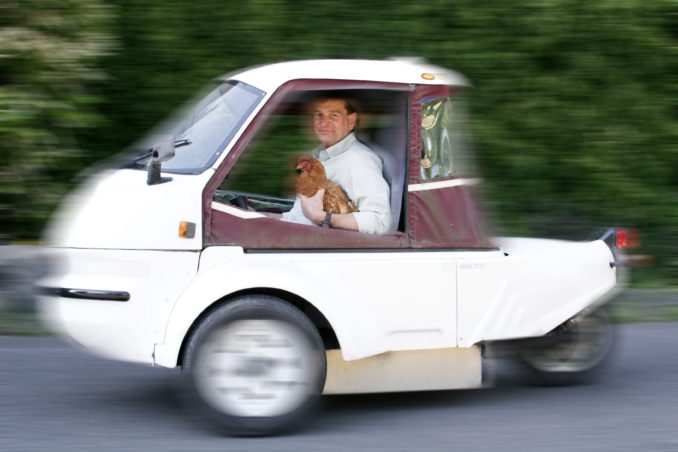
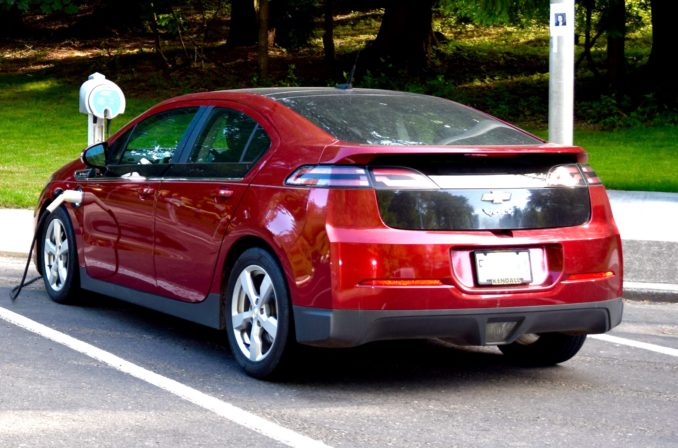
For most of the GIZMO years, we also had a VW Jetta TDI which burned bio-diesel from recycled cooking oil. In 2012 we bought a Chevy Volt which allowed us to get 35-50 all-electric miles on each charge. All our Eugene (around town) miles were full electric with the Volt. It was engineered so when the batteries ran dry, a gas-fired generator kicked in and kept re-charging the batteries so the electric motor could continue to power the car until we could plug it in again. By the time we sold the Volt, we had averaged 75 miles/gallon for the lifetime of the car. It now belongs to a friend in Seattle, a single mom who drives it back and forth to work and, to date, has yet to use a drop of gasoline.
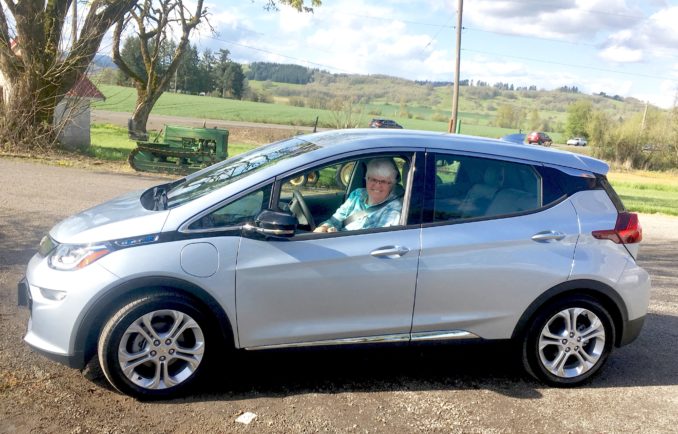
When Tesla, then Chevrolet, Nissan and Ford all announced they were going to manufacture a more affordable 200-300 mile range EV for sale in 2017, we decided we would make another investment in our grandchildren and buy one of these cars as soon as they hit the market. We think people with the means need to invest in this new generation of cars quickly so people can see them on the road and have reason to hope. We figured we would own a Telsa by now, but Chevy was the first to get theirs to market and we loved our Volt, so we test drove Bolts when they got to Oregon in January and bought ours after tax day in April. We bought ours from the local Chevy dealer here in McMinnville. We paid $36,000 for it and will take the $7,500 federal income tax credit which is still available as an incentive for you and me to purchase these cars.
I’m having these car conversations with people all the time. I can’t tell you how many people say they’d really like to own a full EV, but maybe when one of their cars is ready to be traded and the range gets longer and the price shorter. “Okay.” I say. And while you wait, you will keep doing business as usual and your neighbors will follow your example and keep doing business as usual and the world you offer your children and grandchildren will look a lot like the world we used to inhabit and nothing will change and, at the 2040 Climate-Change Summit, we’ll be riding high. Time to start building an Ark—-what will yours be? Next blog, we’ll prepare to take the Bolt on the road.
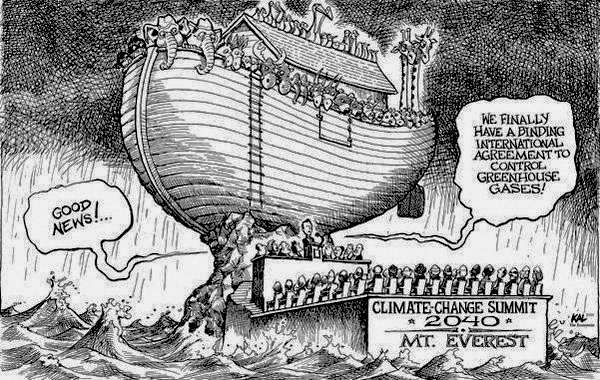

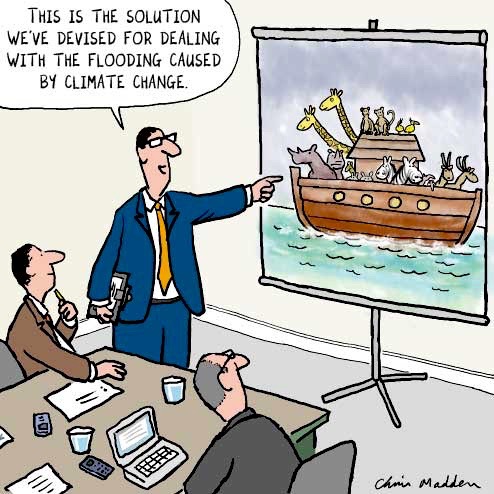
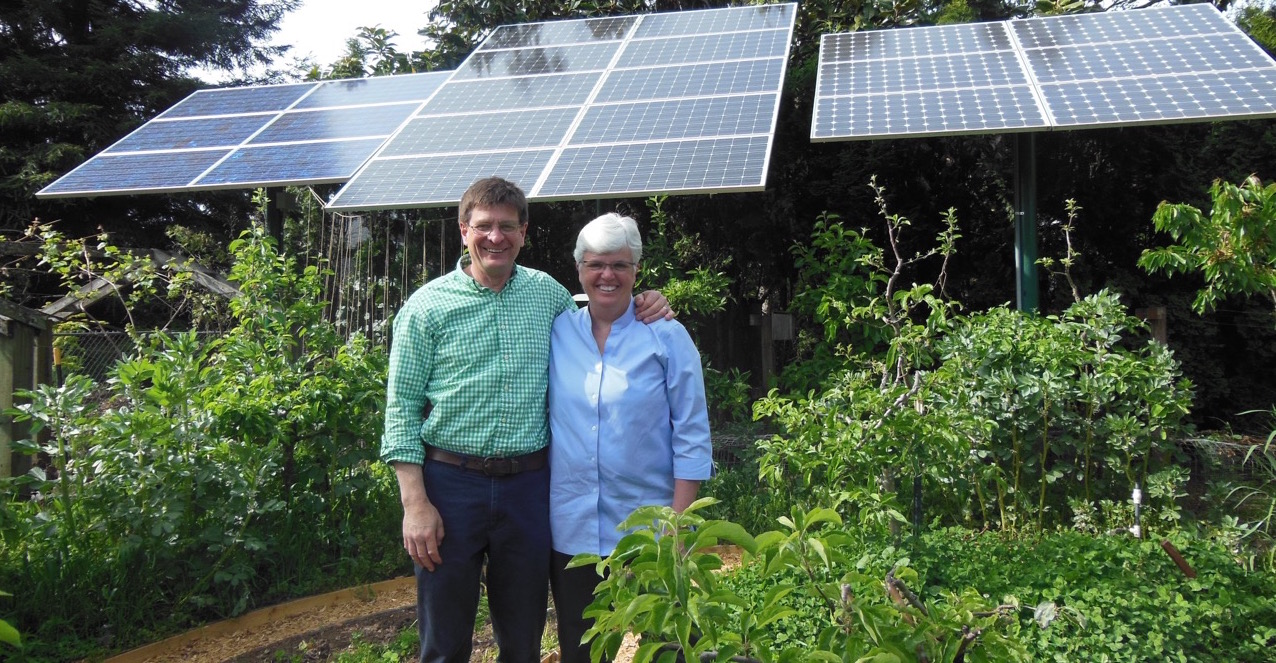




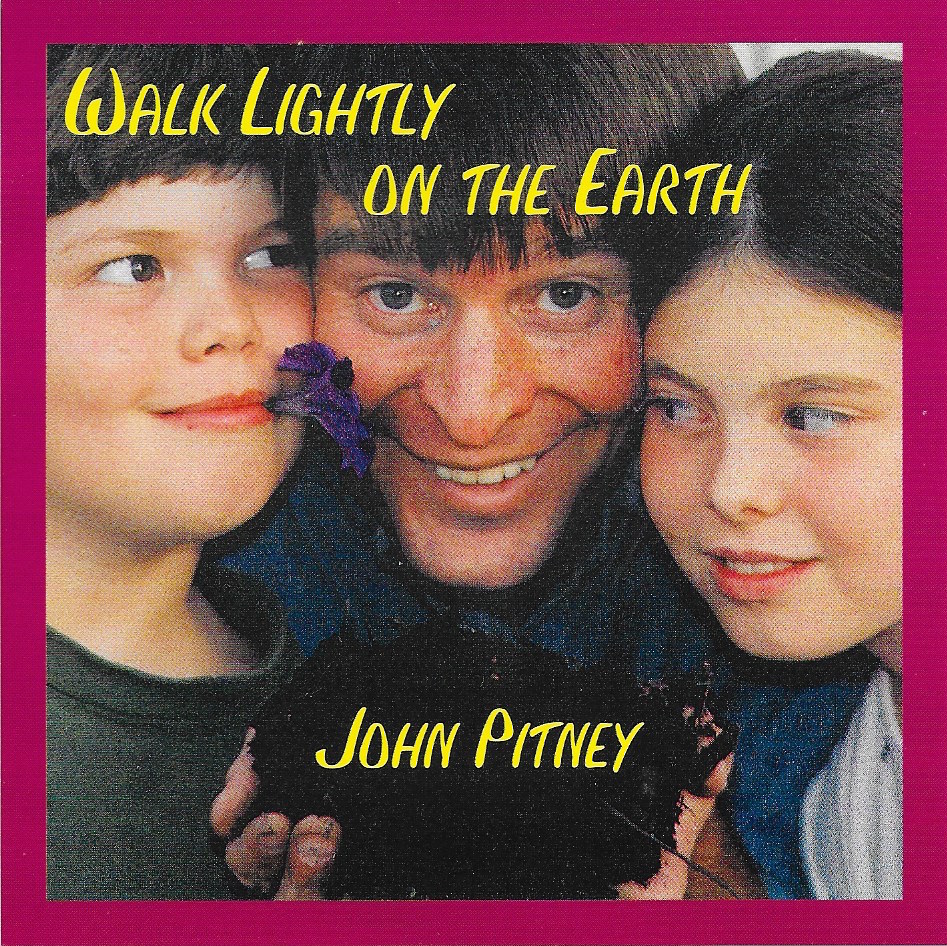
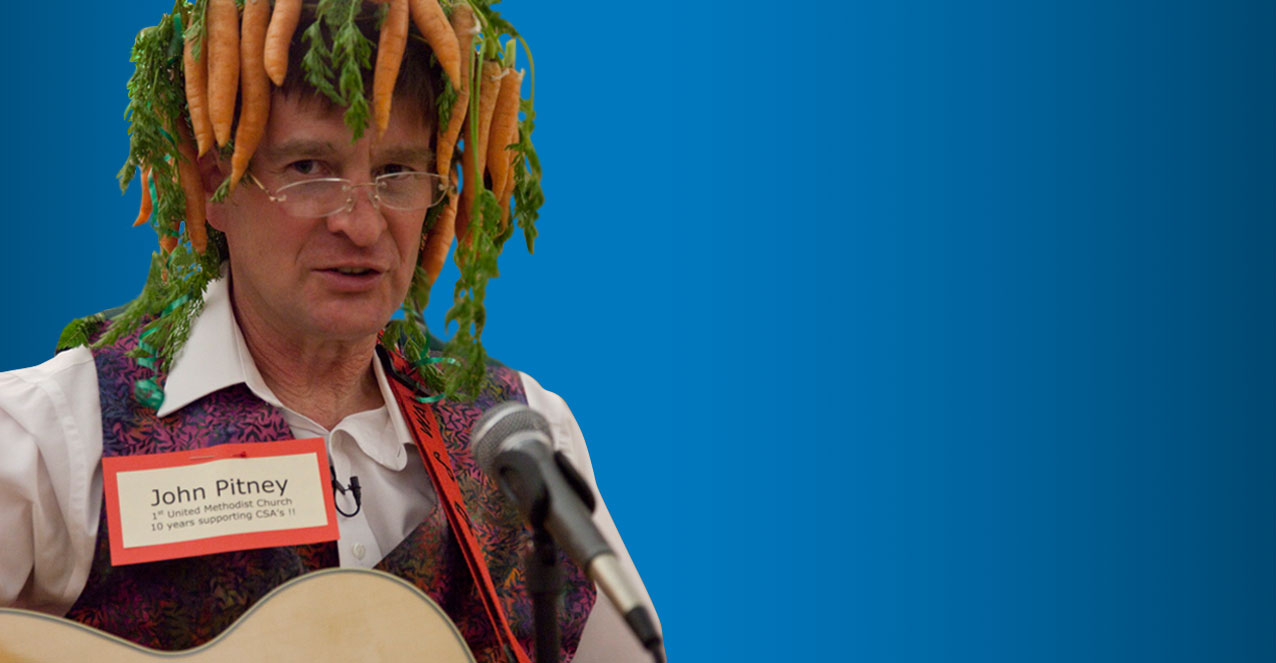
Great article, John. Thanks for living and writing with integrity. Blessings to you and Debbie throughout this holiday season!